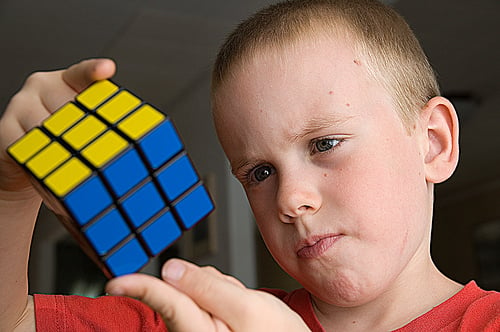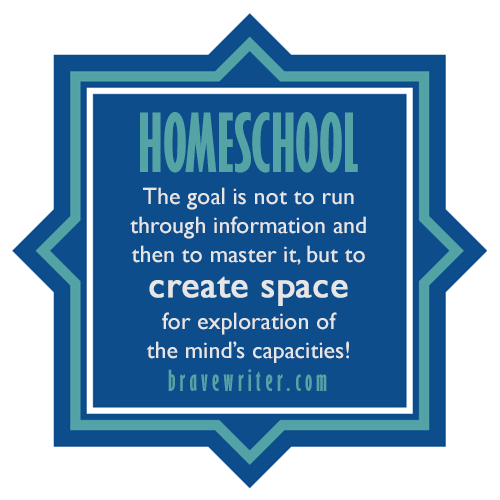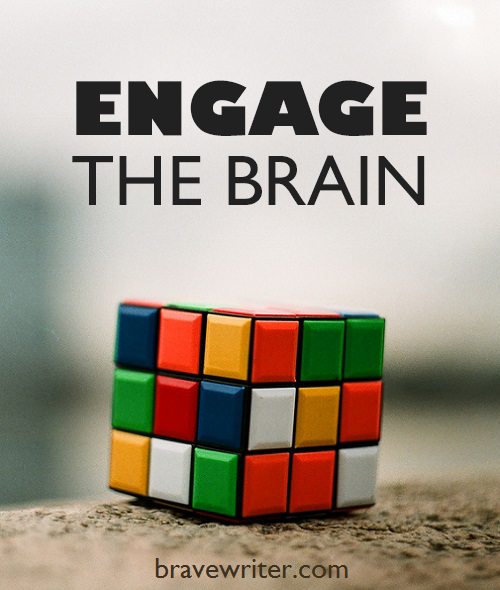“You had ONE job.”
It feels like you have dozens of jobs and that you might not be doing any of them well enough. But the truth is: you have one job. If you’re doing this one job well, everything else will fall into place.
Pinkie promise swear.
Engage the brain.
That’s it. Your task, as a home educator, isn’t to cram a bunch of information into your kids’ heads. It isn’t to get them to master detailed facts, formulae, or figures. You don’t have to have read the entire western canon by the time they turn 18.
The Internet has changed everything—schools are not doing their jobs if all they offer our kids is a plethora of facts and methods that are easily located online.
At home, we have an opportunity to solve the education crisis, one family (one child!) at a time. You know what is causing educators to wring their hands? How to update education to the current technologically drenched world we’re in now!
Learning needs to be about fostering thinkers.
A thinker is marked by these characteristics:
- curious
- able to pose meaningful questions
- correlates information from one discipline with another
- involves personal experience in academic contexts
- willing to take risks
- collaborative
- postulates “what if…?”
- generates multiple possible solutions (not one right answer)
- observes and narrates own process during investigation
- knows how to approach research
- can identify credible versus not credible sources
- open to creative solutions
- expands the utility of the information into other arenas
- interdisciplinary approach to any subject
- skillful in current technologies
You can use any old content to work on these from rocks and geologic formations to Mr. Bingley and vintage dance! The content is no longer the primary goal of education.
THINKING—risky, exploratory, curious, probing thought—is!
 Image by Doug Aghassi (cc)
Image by Doug Aghassi (cc)
What does this look like?
What if instead of opening the math book and teaching your child how to divide fractions based on the three sentence instructions on the colorful page, you put out a variety of objects with knives and scissors and asked your kids to do some dividing?
Perhaps you hand them a pie and tell them you need one-sixth of it on a plate.
Ask them how to go about it. Use the language: one-sixth. Examine the term. Ask them what they think one-sixth means or might be. Ask them for clues in the words themselves. We have the word “one” and we have a version of the word “six.” What might that mean? What is our experience of pie? How many ways are there to cut pieces? Should we always make skinny triangles? Are there other ways to cut it up? Are there other situations that called for dividing things into smaller pieces? Can we apply what we know about pizza?
Keep going. Let them make mistakes. Let them solve the problem incorrectly. Have several pies ready to go.
Before you swoop in with the right answers for how to create fractional parts, let them get the feel of the problem. Let them articulate the problem. Let them explore solutions.
You can even solve problems that are quite mundane: “Toothbrushes are all over the bathroom sink and on the floor. I need problem solvers! Let’s figure out the solution.”
Get out the white board and go to work. Or put the kids in the bathroom (one or two) and let them discuss how they will handle it.
Same thing can be done with any subject. Let’s look at a historical event: the Civil Rights era. It seems incomprehensible that there was ever a time when black Americans were not equal to white Americans.
So let’s explore that—are there groups of people in our world today that make us nervous? (It takes some real courage to have this kind of conversation, but there are possible answers—for women, it could be encountering men at night alone, for kids it could be bullies who leave you out of games in the neighborhood, it could be the people one perceives as “stealing” the right to homeschool…)
Ask questions about history—have there been other times in the past where groups have discriminated against other groups? Why might they?
What in any of us wants to be exclusive? How did skin color make civil rights an especially thorny problem?
And so on.
The goal here is not to run through information and then to master it, but to create space for exploration of the mind’s capacities!
If you’re engaging the brain regularly, you’re on the right track. Information can be found anywhere and offers you plenty of chances to engage the brain. Information alone is no longer enough.

Image at the top of the post by Gundars (cc cropped and text added)


















